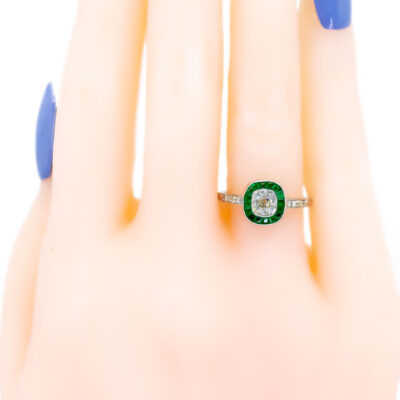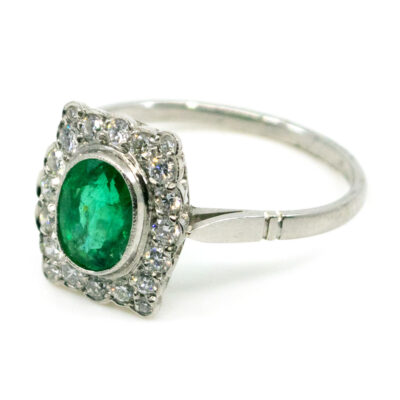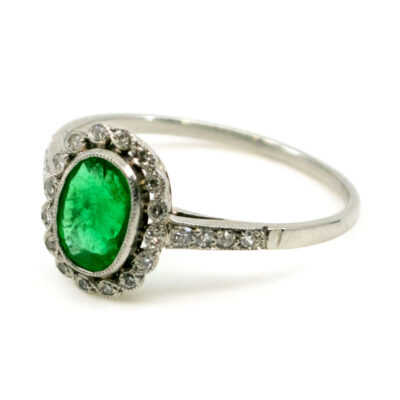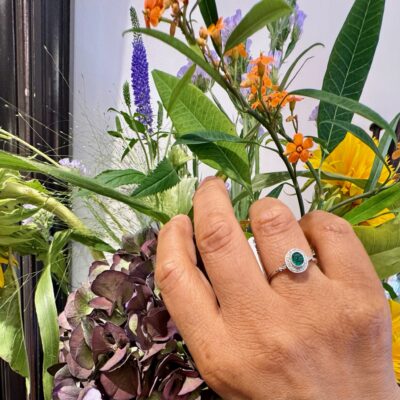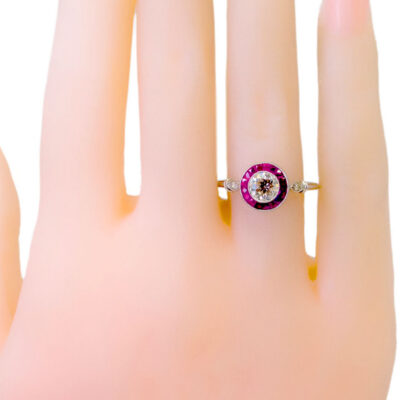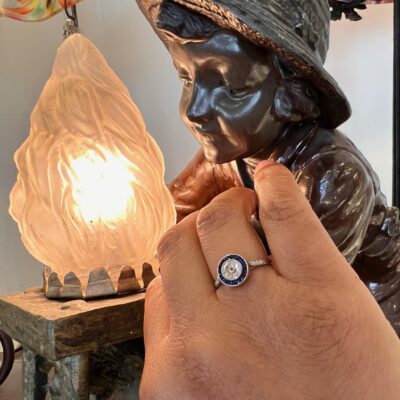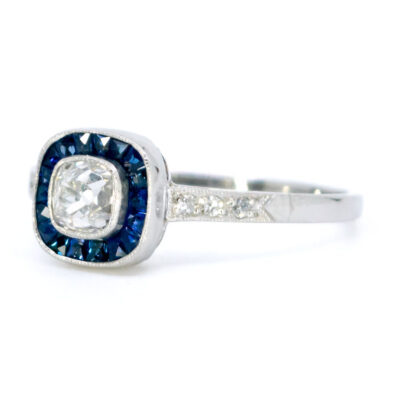This Art Deco-inspired ring showcases a 0.40-carat old European-cut diamond (H SI1) bezel-set in 950 platinum, surrounded by a vivid 0.60-carat emerald halo in a channel setting. An additional ring of small brilliant-cut diamonds and milgrain detailing complete this stunning piece, while delicate openwork in the gallery adds elegance from every angle—a true masterpiece for lovers of vintage charm.
Videos
This Art Deco-inspired ring showcases a 0.40-carat old European-cut diamond (H SI1) bezel-set in 950 platinum, surrounded by a vivid 0.60-carat emerald halo in a channel setting. An additional ring of small brilliant-cut diamonds and milgrain detailing complete this stunning piece, while delicate openwork in the gallery adds elegance from every angle—a true masterpiece for lovers of vintage charm.
Details: center ±0.40ct (H SI1) Old-european-cut diamond, ±0.60ct Emeralds, ±0.20ct ( H SI1) Brilliant-cut diamonds, small Brilliant-cut diamond, Platinum Ring
Size: 17.93 NL / 56.3 FR / 7¾ US / P UK, sizeable (within reason).
Dimensions: H 0.5 x L 1.2 x W 1.2 cm.
Weight in grams: 3.5.
Condition: Very good condition – slightly used with small signs of wear.
| Design Era | |
|---|---|
| Design & Historical Context | At Binenbaum, our 40-year legacy, dating back to the early '80s, is more than just selling jewelry; it's about crafting timeless pieces that blend history with modern quality. Introducing our latest creation: Binenbaum Vintage Revivals. This unique collection draws inspiration from historic eras like Art Deco and Victorian to create contemporary designs that resonate with timeless elegance. But what truly sets Binenbaum Vintage Revivals apart is our commitment to sustainable luxury. We don't just mimic vintage styles; we revitalize and repurpose antique jewelry, ensuring each piece is both enduring and exquisite. In doing so, we infuse our personal touch into every creation, making each item a tribute to the rich history of jewelry and a story yet to be told. |
| Key Materials | |
| Materials & Craftsmanship | Old-european-cut diamond: The Vintage Sparkle of Classic Romance Old European-cut diamonds are a beloved choice for those who appreciate vintage elegance and timeless beauty. This diamond cut, which was predominant from the late 19th century through the early 20th century, is known for its round shape, high crown, small table, and large, open culet. These characteristics give the stone a soft, romantic sparkle that evokes the charm of a bygone era. Historically, the Old European cut was the precursor to the modern round brilliant cut. It was crafted by hand, with each facet carefully shaped to maximize the diamond's brilliance under the softer lighting conditions of the time, such as candlelight. This cut was popular during the Victorian, Edwardian, and Art Deco periods, making it a favorite in antique and vintage jewelry. In modern jewelry, Old European-cut diamonds are highly sought after for their unique sparkle and historical significance. They often exhibit a warmer, more subdued brilliance compared to modern cuts, with an emphasis on depth and fire rather than the bright flashes of light seen in contemporary diamonds. This makes them ideal for engagement rings, earrings, and other pieces that celebrate vintage style and craftsmanship. An Old European-cut diamond is more than just a gemstone; it is a piece of history, reflecting the elegance and romance of the past. Its distinctive charm and enduring beauty make it a perfect choice for those who appreciate the artistry and nostalgia of vintage jewelry. Emerald: The Jewel of Renewal and Prosperity Emerald, with its vibrant green hue, is one of the most prized gemstones in the world, belonging to the beryl family. Its captivating color, ranging from deep forest green to bright spring green, is due to the presence of chromium and vanadium during its formation. Emeralds have been cherished throughout history, from ancient Egyptian pharaohs who believed the stone symbolized eternal youth, to Incan and Aztec civilizations that revered it as a holy stone. In the Renaissance period, emeralds were thought to possess the power to predict the future and reveal truth. In modern jewelry, emeralds are admired for their rich color and elegance. Although they are slightly softer than other precious stones, with a Mohs hardness of 7.5 to 8, their beauty and rarity make them a popular choice for rings, necklaces, and earrings. Emeralds often feature characteristic inclusions, known as "jardin," which add to their uniqueness and charm. Emeralds symbolize renewal, growth, and prosperity, making them a timeless and meaningful choice for jewelry that exudes sophistication and natural beauty. Brilliant-cut diamond: The Pinnacle of Sparkle and Brilliance The brilliant-cut diamond is the most popular and widely recognized diamond cut in the world, renowned for its exceptional sparkle and fire. This cut, perfected over centuries, is designed to maximize the reflection of light, creating the dazzling brilliance that has made it the standard for diamonds in modern jewelry. The brilliant cut features 58 facets—33 on the crown and 25 on the pavilion—carefully arranged to capture and reflect light from every angle. The precision of these facets ensures that light entering the diamond is reflected internally and dispersed into a stunning array of colors, giving the stone its characteristic brilliance. Historically, the brilliant cut evolved from earlier cuts like the Old European and rose cuts, with advancements in diamond cutting technology and understanding of light reflection. This modern cut became widely adopted in the early 20th century and quickly became the preferred choice for engagement rings and other fine jewelry, due to its unmatched sparkle. In modern jewelry, brilliant-cut diamonds are prized for their versatility and unmatched brilliance. They are the go-to choice for engagement rings, earrings, pendants, and virtually any jewelry piece where a classic, sparkling diamond is desired. The round shape and symmetrical design make the brilliant cut ideal for showcasing the inherent beauty of the diamond, regardless of its size. A brilliant-cut diamond is more than just a gemstone; it is a symbol of timeless beauty and perfection. Its unparalleled sparkle and universal appeal make it the quintessential choice for jewelry that celebrates life's most precious moments. Brilliant-cut diamond: The Pinnacle of Sparkle and Brilliance The brilliant-cut diamond is the most popular and widely recognized diamond cut in the world, renowned for its exceptional sparkle and fire. This cut, perfected over centuries, is designed to maximize the reflection of light, creating the dazzling brilliance that has made it the standard for diamonds in modern jewelry. The brilliant cut features 58 facets—33 on the crown and 25 on the pavilion—carefully arranged to capture and reflect light from every angle. The precision of these facets ensures that light entering the diamond is reflected internally and dispersed into a stunning array of colors, giving the stone its characteristic brilliance. Historically, the brilliant cut evolved from earlier cuts like the Old European and rose cuts, with advancements in diamond cutting technology and understanding of light reflection. This modern cut became widely adopted in the early 20th century and quickly became the preferred choice for engagement rings and other fine jewelry, due to its unmatched sparkle. In modern jewelry, brilliant-cut diamonds are prized for their versatility and unmatched brilliance. They are the go-to choice for engagement rings, earrings, pendants, and virtually any jewelry piece where a classic, sparkling diamond is desired. The round shape and symmetrical design make the brilliant cut ideal for showcasing the inherent beauty of the diamond, regardless of its size. A brilliant-cut diamond is more than just a gemstone; it is a symbol of timeless beauty and perfection. Its unparalleled sparkle and universal appeal make it the quintessential choice for jewelry that celebrates life's most precious moments. Platinum: The Metal of Endurance and Prestige Platinum, a rare and precious metal, is renowned for its exceptional strength, purity, and enduring beauty. With its naturally white luster and remarkable resistance to tarnish and corrosion, platinum has become synonymous with luxury and durability in the world of fine jewelry. Historically, platinum has been valued for its rarity and unique properties. Ancient Egyptians and Pre-Columbian civilizations used platinum in their ceremonial jewelry, though its full potential wasn’t realized until the 18th century. By the 20th century, platinum became the metal of choice for royalty and high society, particularly in engagement rings and fine jewelry, due to its ability to securely hold precious gemstones. In modern jewelry, platinum is highly prized for its hypoallergenic properties and its ability to withstand daily wear without losing its brilliance. Its density and weight give it a luxurious feel, while its purity—often 95% pure—makes it an ideal setting for diamonds and other gemstones. Platinum's naturally white sheen enhances the sparkle of gems, and its durability ensures that jewelry pieces crafted in platinum can be passed down through generations. Platinum is more than just a metal; it is a symbol of strength, rarity, and timeless elegance. Its unmatched durability and sophisticated appearance make it the ultimate choice for those seeking jewelry that lasts a lifetime while maintaining its prestige and beauty. |
| Size | |
| Dimensions | H 0.5 x L 1.2 x W 1.2 cm |
| Gender | |
| Weight (in grams) | 3.5 |
| Condition | Very good condition – slightly used with small signs of wear |
By following these tips, you can enjoy your precious jewelry for many years to come.
Related Products
-
Diamond Emerald Platinum Halo Ring 12767-5039
€ 3.995,00 VAT incl. (where applicable) -
Binenbaum Emerald Halo Ring 8803-4967
€ 3.895,00 VAT incl. (where applicable) -
Diamond Emerald Platinum Oval-Shape Ring 10881-5013
€ 4.495,00Original price was: € 4.495,00.€ 3.900,00Current price is: € 3.900,00. VAT incl. (where applicable) -
Emerald Diamond Platinum Cluster Ring 10880-5012
€ 2.895,00 VAT incl. (where applicable) -
Emerald Diamond Platinum Halo Ring 7518-4916
€ 2.695,00 VAT incl. (where applicable) -
Diamond Ruby Platinum Halo Ring 1740-4476
€ 4.595,00 VAT incl. (where applicable) -
Diamond Sapphire Platinum Halo Ring 6961-4858
€ 3.995,00 VAT incl. (where applicable) -
Diamond Sapphire Platinum Halo Ring 6866-4862
€ 3.695,00 VAT incl. (where applicable)
- Home
- Collection
- Fine Jewelry
- Silver Jewelry
- Silverware
- Boxes
- Candlesticks
- Salt and pepper shakers
- Miniatures
- Salt cellars
- Spoon Set
- Condiments
- Frames
- Napkin Ring
- Spoon
- Oddities
- Cups
- Vases
- Cutlery
- Serving Spoon And Cake Server
- Candlesticks
- Baskets
- Hanukkiah
- Spice Tower
- Yad
- Tea Set
- Sugar Castor
- Napkin Rings
- Wine Bottle Coaster
- Wine Stopper
- Tea Pot
- Jugs
- Rattles
- Hip Flask
- Miscellaneous
- Rings 💍
- About
- Contact










